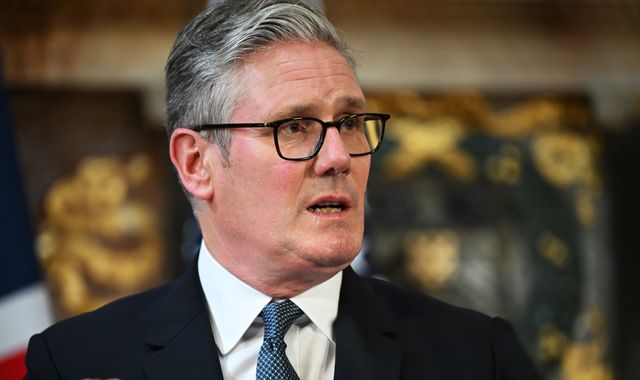The prime minister wrote in The Daily Telegraph that it was now “essential” to tackle “every aspect of the problem of illegal immigration”.
“There is no doubt that for years left-wing parties, including my own, did shy away from people’s concerns around illegal immigration,” he wrote.
“It has been too easy for people to enter the country, work in the shadow economy and remain illegally.”
Sir Keir said Labour is to introduce a free digital ID for adults that would be “mandatory for the right to work by the end of this parliament”.
The plans would require anyone starting a job or renting a home to show the “Brit card” on a phone app, which would then be checked against a database of those entitled to work and live here.
It’s hoped it would reduce the attraction of working in the UK illegally, including for delivery companies.
Read more: The pros and cons of digital IDs – and do we need them?
Workers currently have to show at least one form of physical ID, but there are concerns these can be faked.
The government said the ID would eventually “make it simpler to apply for services like driving licences, childcare and welfare”.
A consultation will look at how the scheme could work for those who may not have a smartphone, such as older people or homeless people.
Lack of ID cards major pull for illegal migrants
French President Emmanuel Macron has repeatedly warned that the lack of ID cards in the UK acts as a major pull factor for Channel crossings, as migrants feel they can find work in the black economy.
Sir Keir will reveal more details about the “Brit card” in a speech at the Global Progress Action Summit in London today.
“For too many years, it’s been too easy for people to come here, slip into the shadow economy and remain here illegally,” he’s set to tell the summit.
The prime minister will add: “It is not compassionate left-wing politics to rely on labour that exploits foreign workers and undercuts fair wages. But the simple fact is that every nation needs to have control over its borders.”
The Labour leader is expected to say that campaigners who think of themselves as progressive must look themselves “in the mirror” and identify areas where they have allowed themselves “to shy away from people’s concerns”.
Sir Keir’s ID card U-turn
The plan represents a shift in the government’s position, as last year ministers ruled out the idea following an intervention from Sir Tony Blair just days after Labour won the general election.
The former Labour prime minister has long been an advocate of ID cards and took steps to introduce a system that would begin as voluntary and could later become compulsory while in office.
Last July, then home secretary Yvette Cooper said of the idea: “It’s not in our manifesto. That’s not our approach.”
The rollout was scrapped after Labour was ejected from power in 2010, having been opposed by the Liberal Democrats and the Tories at the time.
The idea of ID cards has long been opposed by civil liberty and privacy groups in the UK.
Sir Keir is said to have shared their concerns but came round to the idea amid record-high levels of small boat crossings.
Read more from Sky News:
Two more deported under UK-France returns deal
Campaigners on why they oppose asylum hotels protests
A report by the Tony Blair Institute published on Wednesday said digital ID can “help close loopholes that trafficking gangs and unscrupulous employers currently exploit, reducing pull factors driving illegal migration to Britain and restoring control over borders”.
Labour Together, which has been backed by Sir Keir, published a report in June which said digital ID could play a role in right-to-work and right-to-rent checks, supporting “better enforcement of migration rules”.
The announcement has been met with criticism from civil liberty group Big Brother Watch, which said the introduction of ID cards would turn “us into a checkpoint society that is wholly unBritish”, and from Reform UK and the Tories, who argue the ID cards would not stop small boat crossings.
A petition demanding that the government not introduce digital ID cards has already reached half a million signatures.






























